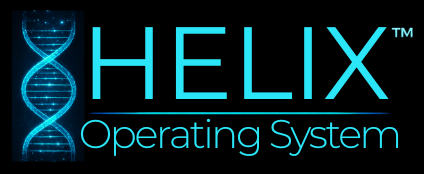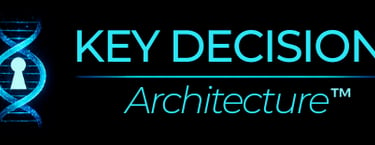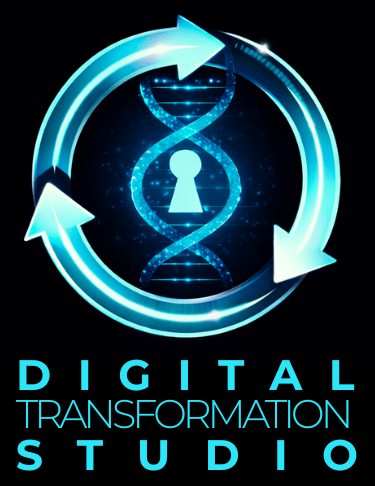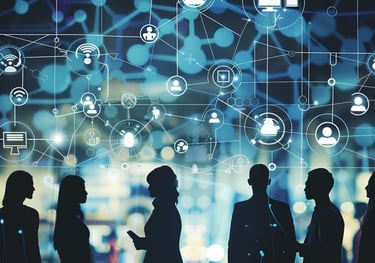Re-architecting how organizations transform so people, technology, and decisions finally work together.
Most digital transformations fail not because of technology—but because organizations lack a shared, decision-led structure that truly connects strategy to execution. The Digital Transformation Studio proprietary frameworks exists to change that.
We are an independent education and thought-leadership studio focused on helping leaders, consultants and tech companies understand how modern enterprises must operate, decide, and evolve in an increasingly complex, multidimensional world. Our three frameworks form a cohesive, future-ready approach to transformation that is faster, more resilient, and designed to scale—regardless of industry, tools, or organizational structure.


Helix™ Operating System
The HELIX™ Operating System is a proprietary operating model, the multidimensional operating system of the future, designed to keep business strategy, execution, data, and technology continuously aligned.
Helix clarifies ownership across leadership levels and functions, enables feedback to flow in all directions, and provides a stable “north star” to guide organizations, tools, and teams into the future.
Our Core Frameworks
CADENCE™ Blueprinting
The modern transformation blueprinting approach that replaces rigid phase gates with a structured, adaptive cadence.
CADENCE's proprietary blueprinting methodology helps organizations move faster to meaningful MVPs, surface risks earlier, and evolve roadmaps intelligently—without sacrificing long-term scalability. CADENCE™ reduces transformation timelines from 6-12 months to 2-6 months, depending on the technology solution. This is the drumbeat that enables all functions and levels to move in unison to repeatedly successful outcomes.
Key Decision Architecture™ (KDA)
Key Decision Architecture is the proprietary mechanism that enables the HELIX™ Operating System, enabled through CADENCE Blurprinting. This is the mechanism that transforms flat, siloed organizations into the Helix Operating System's decision-led foundation for transformation.
KDA defines the critical business decisions that must be enabled, the data required to support them, and the cross-functional alignment needed to operationalize them—before downstream design and build begins.






What is a Digital Transformation?
Digital Transformation refers to the process of integrating digital technologies into all aspects of a business, fundamentally changing how organizations operate and deliver value to customers. It encompasses a cultural shift as well, inspiring organizations to continually challenge the status quo, experiment, and become more agile.
Digital Transformations are holistic and evolve how a company designs their tech solutions, processes and organization structures. Key aspects of digital transformation include:
INNOVATION:
Digital Transformations integrate and streamline foundational needs of a business so that employees do less “data munging” and are enabled to innovate at speed.
CULTURAL CHANGE:
Fostering a culture that embraces change, encourages experimentation, and values flexibility to adapt to evolving market conditions. Employees start living with an entrepreneurial spirit, powered by clear communication channels and permanent integration with innovation teams.
DATA-DRIVEN DECISION MAKING:
Leveraging data, analytics and insights to inform strategic business decisions, identify market trends, and enhance overall performance.
COLLABORATION AND CONNECTIVITY:
Enhancing collaboration within teams and with external stakeholders through digital platforms, enhancing communication and workflow.
TECHNOLOGY INTEGRATION:
Implementing advanced technologies such as cloud computing, artificial intelligence, data analytics, Internet of Things (IoT), and automation to streamline operations and enhance services.
BUSINESS MODEL INNOVATION:
Rethinking and evolving traditional business models to create new revenue streams and enhance competitive advantage through digital products, services, or delivery methods.
OPERATIONAL EFFICIENCY:
Automating processes and utilizing digital solutions to increase employee productivity, reduce costs, and optimize resource allocation.
CUSTOMER EXPERIENCE ENHANCEMENT:
Using digital tools to improve customer interactions, create personalized experiences, and enhance service delivery.
Digital transformation is not just about adopting new technologies; it's a holistic approach that requires organizational change, strategic vision, and a commitment to continuous improvement, all aimed at thriving in a rapidly changing digital landscape.


Understanding the Digital Evolution reveals why most companies are stuck in siloed, dysfunctional and manual ways of working and what it takes to unlock streamlines processes and tools that deliver value:


Industry 1.0 to Industry 5.0
Industry 1.0: The First Industrial Revolution marked the transition to new manufacturing processes in the late 18th century, characterized by the use of steam power and mechanized production.
Industry 2.0: The Second Industrial Revolution, occurring in the late 19th and early 20th centuries, introduced mass production and assembly lines powered by electricity.
Industry 3.0: The Third Industrial Revolution, starting in the late 20th century, saw the rise of digital technology, automation, and the advent of computers and electronics in manufacturing.
Industry 4.0: Industry 4.0, often referred to as the Fourth Industrial Revolution, represents the era of automation and data exchange in manufacturing technologies. It integrates cyber-physical systems, the Internet of Things (IoT), cloud computing, and cognitive computing to create smart factories. Key aspects include advanced robotics, big data analytics, autonomous machines, and real-time data processing to optimize manufacturing processes, improve efficiency, and enhance productivity.
Industry 5.0: Industry 5.0 goes beyond the automation and digitization of Industry 4.0 by emphasizing the collaboration between humans and machines. It focuses on personalized production and the human-centric approach, leveraging advanced technologies like artificial intelligence (AI) and machine learning (ML) to work alongside humans. This era aims to balance efficiency with sustainability, emphasizing human creativity, well-being, and social impact alongside technological advancements.
From Excel to AI: How Stagnation in Industry 4.0 Delays the Leap to Industry 5.0
Despite the promise of Industry 4.0, approximately half of the world's businesses struggled with its implementation. Many enterprises faced challenges in integrating advanced technologies, resulting in limited success and reliance on basic tools like Microsoft Excel. These organizations were unable to fully capitalize on the potential of smart manufacturing, real-time data analytics, and autonomous systems, leading to inefficiencies and competitive disadvantages.
Meanwhile, industry leaders who successfully adopted Industry 4.0 technologies have already transitioned to Industry 5.0. These pioneers are now leveraging machine learning and AI to create more adaptive, personalized, and sustainable production processes. The collaboration between humans and intelligent machines is driving innovation, enhancing productivity, and promoting a human-centric approach to manufacturing. The gap between these forward-thinking leaders and those left behind in the wake of failed Industry 4.0 implementations continues to widen, underscoring the importance of strategic technology adoption and continuous innovation.
CADENCE™ Blueprinting
Our CADENCE™ Blueprinting proprietary methodology empowers organizations at any maturity level to build fully unified ways of working across Business, Technology, Process, Data, and Analytics—unlocking new operating models and an up-skilled, future-ready workforce.
Whether your teams are moving from chaotic, inconsistent workflows to a standardized Excel-driven process, or from Excel to a globally integrated digital ecosystem powered by analytics, machine learning, and AI agents, CADENCE™ Blueprinting accelerates transformation with precision and clarity.
No more six-month process mapping exercises that sit on a shelf.
No more strategy documents that fail at the first step of execution.
No more tech implementations users refuse to adopt.
CADENCE™ Blueprinting creates harmonized, scalable, value-driven ways of working—and a unified, motivated workforce that can grow, adapt, and evolve together.
Transformation doesn’t have to fail.
With CADENCE™, it works—every time.


